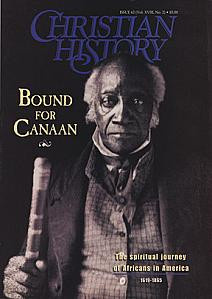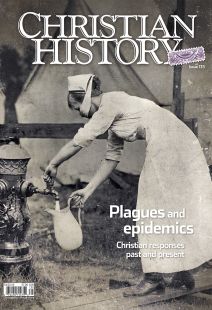Absalom Jones Bought His Freedom and Became a Priest
ABSALOM JONES was born a slave in Delaware. Quick-witted, he taught himself to read, using the New Testament as one of his texts. When he was sixteen, Wynkoop, a store owner in Philadelphia, bought him. Wynkoop allowed him to attend a Quaker school at night and to save any money he earned on the side. Jones married a fellow slave and purchased her freedom so their children would be born free. He was thirty-eight before he had saved enough money to purchase his own freedom.
Jones served as a lay minister at St. George’s Episcopal Church. His efforts and those of his colleague Richard Allen brought so many converts to the church that its white leaders grew alarmed. Without warning they banned all blacks to a gallery (which the black parishioners themselves had built, not realizing its intended use.) The ushers literally dragged the unsuspecting Jones from the altar, although he begged to at least be allowed to finish his prayer.
Humiliated and outraged, the blacks marched out of St. George’s. At first they met as part of the Free African Society, an organization led by Jones and Allen that served as a political, religious, and mutual aid society. However, Jones soon sought ordination with the Episcopal Church and Allen with the Methodists.
On this day, 21 September 1802, Bishop William White ordained Absalom Jones as America’s first black priest in the Episcopal church—indeed, the first black minister of any mainstream church in America. (The Episcopalians would later be the only major religious group not to divide over the issue of slavery during the Civil War era.) Jones founded St. Thomas’ Church, which grew to over five hundred members in its first year alone.
On 1 January 1808, the international slave trade became illegal in the United States. Jones preached a thanksgiving sermon, pointing out parallels between Israel in Egypt and Africans in America. His sermon warned slaveholders and included five actions free blacks could take to show their gratitude to God. One was to conduct themselves in a worthy manner. “Above all things, let us instruct [our children] in the principles of the gospel of Jesus Christ, whereby they may become wise unto salvation.”
Always eager to do good, Jones founded schools and a society to fight vice. He joined in establishing an insurance company. Alert to the power of networking and united action, he even became head of Philadelphia’s first black Masonic lodge. He died in 1818, having never lost his sense of the importance of Christian faith, or the need to embody it in social action.
—Dan Graves
-------------
Absalom Jones freed African Americans from the bondage of sin; Harriet Tubman also helped them escape the shackles of enslavement. Harriet Tubman: They Called Her Moses
For more about Absalom Jones, see "Absalom-Jones" in Christian History #62 Bound for Canaan
and “The Lord brought all this dying” in Christian History Issue #135, Plagues and epidemics







